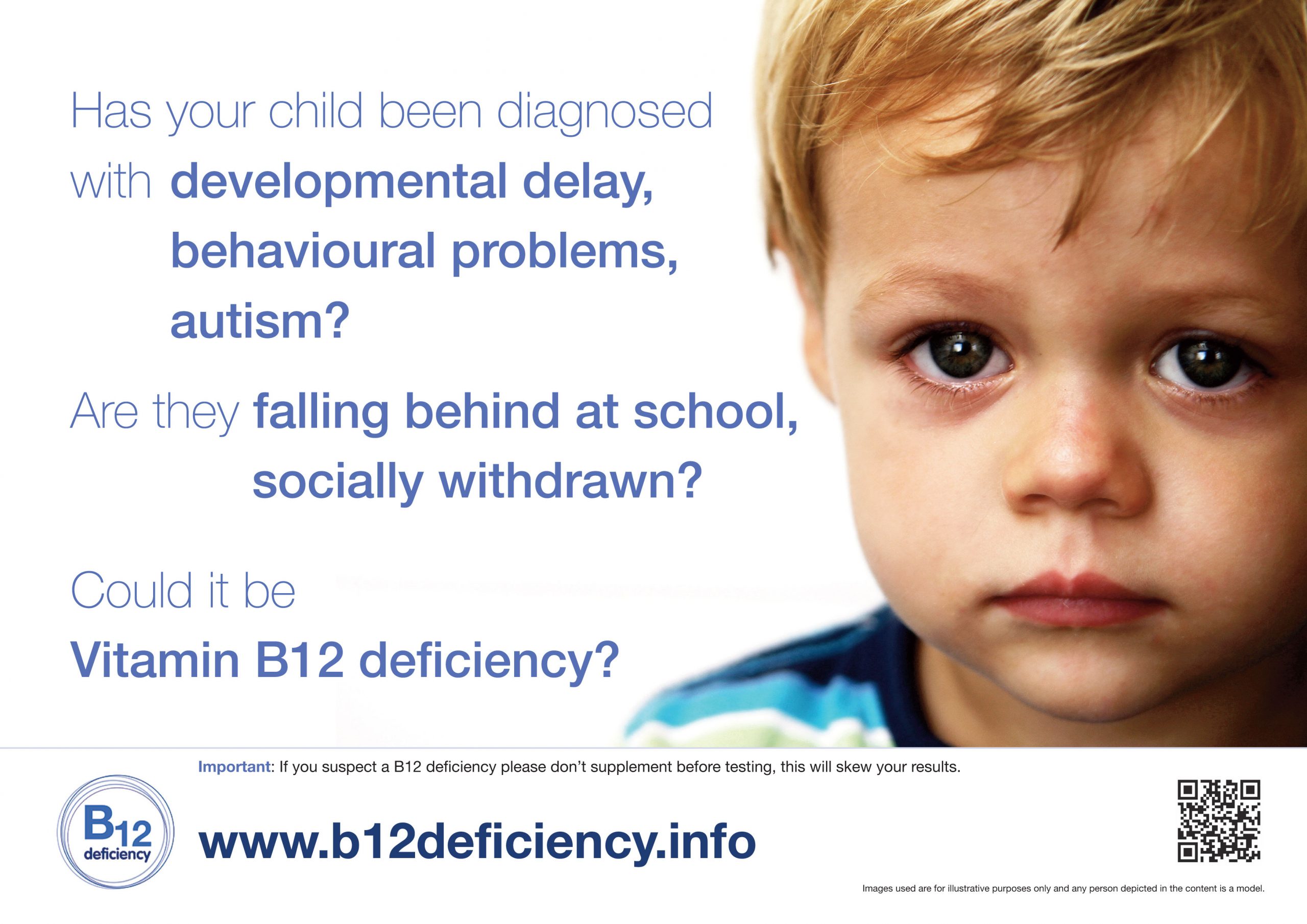B12 is tragically undiagnosed and misdiagnosed in children, for many doctors testing for this deficiency is not even on their radar. In the rare cases when it is tested, there’s every likelihood it won’t be diagnosed due to the dangerously low lab reference ranges in the UK – as ridiculously low as 110ng/L at East Lancashire NHS Trust.
If a child is vegetarian or vegan and is not being given a supplement for B12 or was breast fed by a vegetarian or vegan mother who was not advised by their clinician’s to supplement B12, the risk of this deficiency is much higher.
In children who are heavily symptomatic and their deficiency it is not diet related, they may have B12 serum levels which are within range or even look like ‘healthy levels’. It would be pertinent to carry out further tests such as MMA, and Homocysteine tests. Sadly the B12 serum test is flawed but this information has not necessarily filtered through to clinicians.
If all symptomatic children with a B12 level below 500ng/L were treated without question and worried parents pleas for help listened to, this would go some way towards halting the untold suffering that families cope with every day. Tragically though, some of these children leave their doctors surgery with drugs to treat misdiagnoses of autism or ADHD. These drugs may or may not modify their symptoms, but the fact remains, deterioration caused by the lack of B12 will continue without essential B12 injections.
A therapeutic trial of B12 injections would be extremely valuable for ‘within range’ symptomatic children. These should be carried out with continuous every other day injections in the presence of neurological symptoms.
If a family has a high prevalence of diagnosed pernicious anaemia then it would be entirely sensible to screen children in these families. In adults this deficiency, if identified early enough, can be treated effectively and simply, reversing all symptoms. In children the story can be very different. The nervous system is still developing and if this vital nutrient is lacking then the damage may be irreversible.
All health professionals need to understand that this deficiency does not just affect women over 60. Terrified parents who know that their children are suffering from the same serious symptoms that they themselves experience should be listened to and heard. If you haven’t yet read Sally Pacholok’s book Paediatric B12 deficiency then please consider arming yourself with it.
Signs & symptoms in infants and children
• Developmental delay or regression.
• Apathy – Irritability.
• Hypotonia (decreased muscle tone).
• Weakness.
• Tremor.
• Involuntary movements.
• Seizures (fits).
• Ataxia (Neurological disorder affecting balance, coordination and speech).
• Anorexia and other eating disorders.
• Failure to thrive.
• Poor weight gain.
• Poor head growth.
• Poor socialisation.
• Poor motor skills.
• Language delay.
• Speech problems.
• Lower IQ – Mental retardation.
• Anaemia.
• Macrocytosis (large red blood cells) Note – need not be present!
Red flags of B12 deficiency in infants, children and Teenagers
If your child exhibits any of the following signs or symptoms, insist that your doctor tests for B12 deficiency.
• Movement problems, including difficulty in walking or writing.
• Mental changes – irritability, altered mood, poor memory, “flat” emotional tone, autistic-like withdrawal.
• Vision problems/abnormalities.
• Slowed weight and height gain.
• Leg pains or other abnormal sensations.
• Fatigue.
• Loss of appetite.
• An abnormally small head circumference in infants or toddlers.
• Apathy,lethargy, or irritability.
• Involuntary movements, such as arm waving in infants or toddlers.
• Tics.
• Grey hairs / premature greying.
• Areas of hypo pigmented skin in a Caucasian child and/or vitiligo, or areas of hyper pigmented skin in a black or Asian child.
• A rooting reflex after eight months of age (this reflex is usually absent after six months of age.
• A history of any surgery (including dental surgeries) involving nitrous oxide. This anaesthetic agent is often administered during dental work or surgeries such as insertion of ear tubes in children with chronic ear infections, can inactivate the body’s stores of B12 and cause severe neurological damage.
• Failure to thrive (poor appetite, poor growth and/or weight gain, general poor health).
• Chronic constipation.
• A diagnosis of developmental delay, autism, cerebral palsy, mental retardation, or other neurological disorder.
• Severe food allergies or sensitivities.
• A diagnosis of coeliac disease or gluten enteropathy.
• A thyroid disorder or other autoimmune disorder.
• A history of stroke or a diagnosis of arteriosclerosis.
• A diagnosis of any psychiatric or behavioural disorder including ADHD.
• A diagnosis of Downs Syndrome.
List Information provided with kind permission of Sally M. Pacholok R.N. & Dr. Jeffrey J. Stuart.
Best wishes, Tracey


This is a great article! I wish I had read this when my son was diagnosed with Sensory Processing Disorder at age 4! He’s 15 now and finally getting the right treatment!
The worst part, is even if they are tested and are low enough to get treatment on the NHS the shocking understanding of clinicians mean that many are now being given tablets or even just a single injection rather than the treatment guidelines already issued. Many GPs have said that they don’t need loading doses, or ongoing every other day injections for neurological symptoms because they are children, when the case is actually the opposite and their need for injections is higher due to ongoing neurological development.